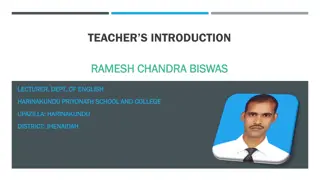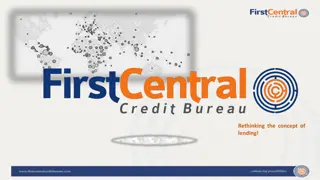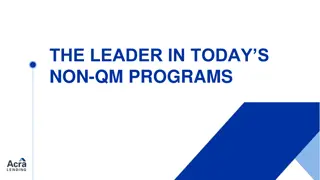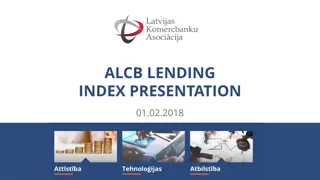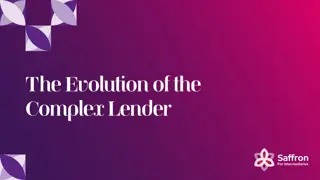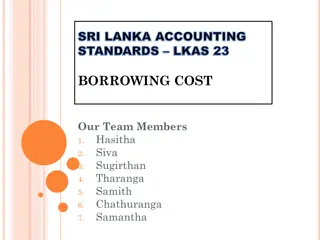Enhancing Lending and Borrowing Dreams: OCUL's Collaborative Initiatives
Explore how the Ontario Council of University Libraries (OCUL) is revolutionizing library services through radical collaboration, shared resources, and streamlined fulfillment processes. The presentation highlights OCUL's mission to standardize borrowing policies, improve user experience, and maximize resource accessibility across its member institutions.
Download Presentation

Please find below an Image/Link to download the presentation.
The content on the website is provided AS IS for your information and personal use only. It may not be sold, licensed, or shared on other websites without obtaining consent from the author.If you encounter any issues during the download, it is possible that the publisher has removed the file from their server.
You are allowed to download the files provided on this website for personal or commercial use, subject to the condition that they are used lawfully. All files are the property of their respective owners.
The content on the website is provided AS IS for your information and personal use only. It may not be sold, licensed, or shared on other websites without obtaining consent from the author.
E N D
Presentation Transcript
How To Fulfil All Our Lending and (Our Patrons ) Borrowing Dreams A presentation by OCUL CF Shared Resources Subcommittee: Adam Taves, Chair Jacqueline Cato Mandy Deans Kassies Samantha Gibbon Ian Gibson Ingrid Moisil Linda Whidden
Whats OCUL? Ontario Council of University Libraries is the consortium of Ontario s 21 University Libraries A history of collaboration
OCUL Collaborative Futures Radical collaboration years in the making: Implement shared next generation library services platform Collaborate to manage and preserve print resources in a sustainable system. Collaborate to effectively use shared systems to manage electronic & print resources
Collaborative Futures Shared Resources Subcommittee Committee membership CFSR was to draft policies in the areas of Access Services and Acquisitions as they relate to the effective and efficient management of shared resources of Collaborative Futures
Fulfillment First Our task: It is envisioned that borrowing policies will be normalized across OCUL institutions to provide consistent terms of service to all OCUL users -CF Priority Collaboration Outcome Shared Patron Services and Policies a seamless interface which would make discovery and direct requesting of resources easy for patrons for all OCUL libraries Among the partners, various fulfillment options should be possible including physical and electronic lending as well as on-demand digitization of requested resources. - CF Priority Collaboration Outcomes Fulfillment
Alma and the Automated Fulfillment Network Resource sharing options in Alma Why an Automated Fulfillment Network (AFN)?
Guiding principles Maximize ease of use for users and staff Maximize use of our print collections Local collections become OCUL collection Only create policies where they are necessary
How We Pitched the Vision Gathered information and feedback from other Consortium networks. Commitment to the CF Fulfillment priority goal. The sales pitch to the CF OCUL Directors. Reached out to staff
Policies Establishment of a Collaborative Future Fulfillment Network 0.1 Appeals 0.1 Blocks 0.2 Charges & Fines 0.3 Limit on Number of Borrowed Items 0.3 Recalls 0.3 Renewals 0.2 Reserves 0.2 Standardized Loan Periods 0.3 User Groups 0.3
Policies - Standardized Loan Periods Shared Patrons receive standardized regular loan periods for physical items open to the Network (e.g. Fulfillment Units such as general ) from across CF partners as follows: Monographs: 120 days. Media (e.g. film and audio recordings): 14 days. Other formats (e.g. periodicals, government documents, microformats, etc. that are shared): determined locally, with a suggested loan period of 14 days.
Policies - Charges & Fines Overdue fines will not be charged for regular loans of any materials. Patrons will be given 30 days to return materials that are overdue to a Fulfillment Network partner before the item is declared lost. ... Items declared lost will incur the following charges: $25 non-refundable administration charge $125 default replacement charge (subject to adjustment at discretion of owning institution)
Challenges - Collaboration is always hard Acknowledging and managing fears Ceding some control Socializing ideas slowly Simplification Navigating natural tension between rank-and-file and directors Local vs. the Community
Challenges - Timing Concrete policy & workflow development in an environment largely unknown Implementation delays Staged/Delayed implementation of collaboration-wide fulfillment network Time of academic year to launch problematic
Challenges - Vendor Attention Interpretation - further down road you go, the more customized and less understandable configs are to the vendor Time Learning by doing vs Getting it done Getting the right person to answer your question
Future opportunities Beginning conversations of how the AFN might affect our library mission and collection policies. Management of the AFN - Centralized staff at OCUL? Harnessing the power of a shared LSP and analytics in a collaborative environment for collection assessment.
Blue Sky Thinking Joint Approval Plans amongst CF libraries to cooperatively build subject specific collections: eg. Human rights and Forced Migration. Importing the Network Zone Holdings into our Vendor ordering system. Establishing CF wide vendor discounts so that all libraries enjoy the same discount regardless of budget size.
Have Your Say Questions? Ideas to share?







